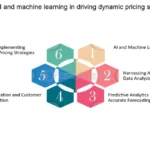Introduction: In the ever-evolving world of marketing, staying ahead of the curve is crucial. As technology continues to shape the landscape, businesses must adapt and embrace innovative solutions to connect with their target audiences more effectively. Generative AI has the potential to revolutionize the way we approach audience segmentation, personalization, and content creation. Unlike traditional AI models that rely on pre-existing data, Generative AI has the capability to create entirely new and unique outputs, such as text, images, audio, and even code. This opens up a world of possibilities for marketers seeking to craft highly personalized and engaging content tailored to their specific target audiences.
- Audience Segmentation and Personalization: One of the key advantages of Generative AI is its ability to analyze vast amounts of data and identify patterns that can inform targeted marketing strategies. By leveraging machine learning algorithms, Generative AI can process customer data, including demographics, purchase histories, browsing behaviors, and social media interactions, to gain deep insights into audience preferences and behaviors.
- Armed with these insights, marketers can create highly segmented audience profiles and develop personalized content that resonates with each specific group. Generative AI can generate tailored messaging, product recommendations, and even entire marketing campaigns that speak directly to the unique needs and interests of each target segment.
- Dynamic Content Creation: Generative AI is also a powerful tool for content creation, enabling marketers to produce high-quality, engaging, and relevant content at scale. By training Generative AI models on vast datasets, businesses can generate a wide range of content, from blog posts and social media updates to product descriptions and email campaigns.
- This not only saves time and resources but also ensures consistency and accuracy across various marketing channels. Additionally, Generative AI can adapt and optimize content in real-time based on user interactions and feedback, ensuring that messaging remains relevant and effective.
- Personalized Customer Experiences: By combining audience segmentation, personalization, and dynamic content creation, Generative AI empowers businesses to deliver truly personalized customer experiences. Imagine a scenario where a customer visits an e-commerce website, and the site’s Generative AI system analyzes their browsing behavior, purchase history, and preferences to generate a tailored product recommendation, complete with a personalized marketing message and visuals.
- This level of personalization not only enhances the customer experience but also increases the likelihood of conversions and customer loyalty.
- Ethical Considerations and Challenges: While Generative AI presents exciting opportunities for targeted marketing strategies, it is essential to address ethical considerations and challenges. Responsible use of customer data, transparency, and bias mitigation are crucial to maintaining trust and ensuring the ethical deployment of Generative AI in marketing.
Additionally, businesses must navigate potential legal and regulatory frameworks surrounding the use of AI technologies, particularly when it comes to data privacy and consumer protection.
Conclusion: Generative AI is poised to revolutionize targeted marketing strategies, enabling businesses to deliver highly personalized and engaging content at scale. By harnessing the power of this technology, marketers can gain a deeper understanding of their target audiences, create tailored messaging, and ultimately provide exceptional customer experiences. However, as with any transformative technology, ethical considerations and responsible implementation must be at the forefront to ensure long-term success and maintain consumer trust.







